Dorylus (Alaopone) conradti Emery
 Males - Males -   Type locality Togo (Dorylus conradti n. sp., Emery,
1895j: 734, worker & queen, illustrated; in Wheeler, 1922) from
Bismarckburg, collected by Conradt - see below Type locality Togo (Dorylus conradti n. sp., Emery,
1895j: 734, worker & queen, illustrated; in Wheeler, 1922) from
Bismarckburg, collected by Conradt - see below
subspecies berlandi
(Dorylus (Alapone) conradti
Em. v. berlandi n. var.,
Santschi, 1926b: 209, worker) from Ivory Coast, collected at
Bingerville by L. Berland - see below
workers and queen known (see Bolton, 1995)  . .
I have associated the male shown below with this species
as it is the only named Alaopone species for which the male is
undescribed and this specimen is quite distinct from all the described
males. The yellow clay base colour matches that given for the queen and
major worker, with a reddish head
|
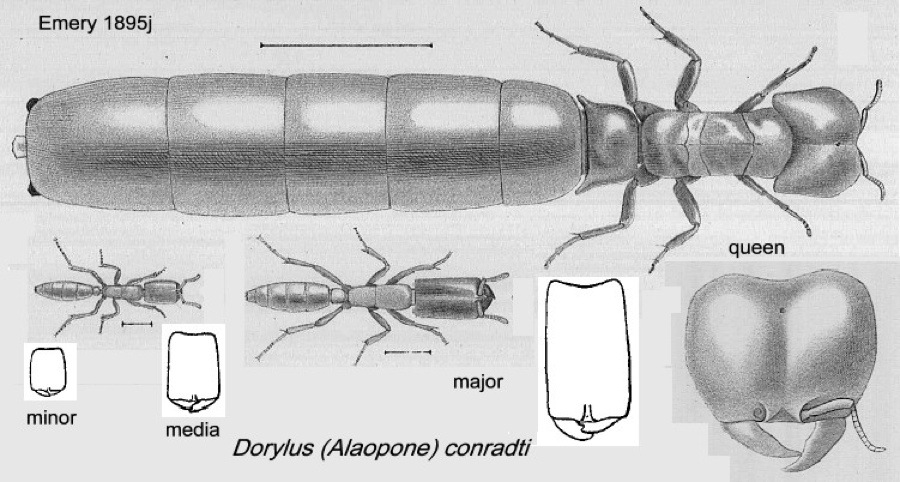 TL - Emery's
specimens to 6.5 mm, Wheeler's note (1922)
was for specimens with TL only 4.5-5.0 mm; the soldier having a
coarsely punctate thorax and a very elongate head, which with closed
mandibles was nearly twice as long as broad. TL - Emery's
specimens to 6.5 mm, Wheeler's note (1922)
was for specimens with TL only 4.5-5.0 mm; the soldier having a
coarsely punctate thorax and a very elongate head, which with closed
mandibles was nearly twice as long as broad.
Emery's (1895j) description is at  and of the queen at and of the queen at  . Santschi's (1926b) of berlandi is
at . Santschi's (1926b) of berlandi is
at  . .
Also from Cameroun, at Soppo (van Rothkirch) and
Zaïre, Niangara, Lang & Chapin, from the stomach
of a frog (in Wheeler, 1922). The last were found in the stomach of a
frog.
|
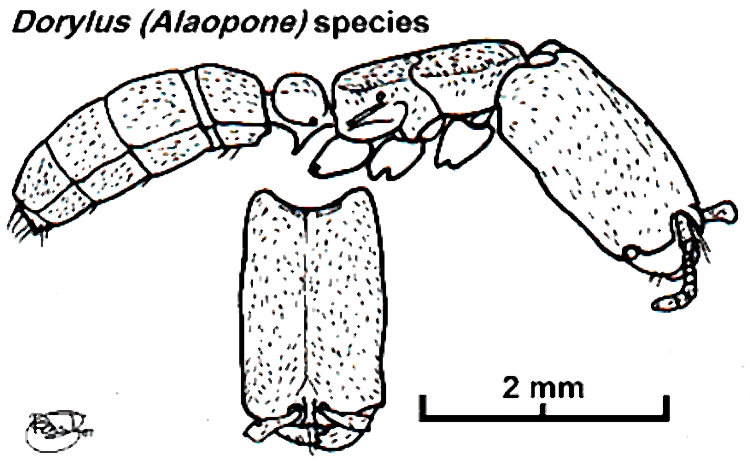 Nigeria
species (as Dorylus (Alaopone) species 1, Taylor, 1980b: 9) Nigeria
species (as Dorylus (Alaopone) species 1, Taylor, 1980b: 9)
TL 6.71-2.74 mm. Largest morph HL 2.09, HW 1.28, SL 0.49, PW 0.72
Colour orange-brown, mandibles darker. Sculpturation all over of
scattered hair-pits, giving rise to fine pilous hairs. Erect hairs only
at anterior and posterior apices of body. Head of larger morphs
elongated and near rectangular. Alitrunk completely flat dorsally.
Subpetiolar process a triangular spine, slightly hooked to the rear in
largest morph, straight in medium morphs and blunt in smallest.
Collected from under bark (presumably of dead wood) at the Cocoa
Research Institute of Nigeria, Idi Ayunre, by B. Bolton.
Earlier (i.e. pre-July 2014), I felt the drawn worker from Nigeria might be D. aethiopicus. From Forel's (1907b) description of aethiopicus
and his comparative notes between the known workers of Alaopone,
notably conradti, it seemed the head of aethiopicus is
longer and more deeply impressed posteriorly, with the thorax dorsum
flatter and its sides parallel. Also with aethiopicus seen from
above the sides of the pro- and mesonotum are slightly convex, such as
to give a median concavity in the sides of the thorax. Then with conradti
the thorax has a more dense and elongated puncturation, also the
petiole is less trapeziform (in dorsal view) and the mandibles are
thicker. Thus, the type images and the type location show my drawing to be of conradti.
|
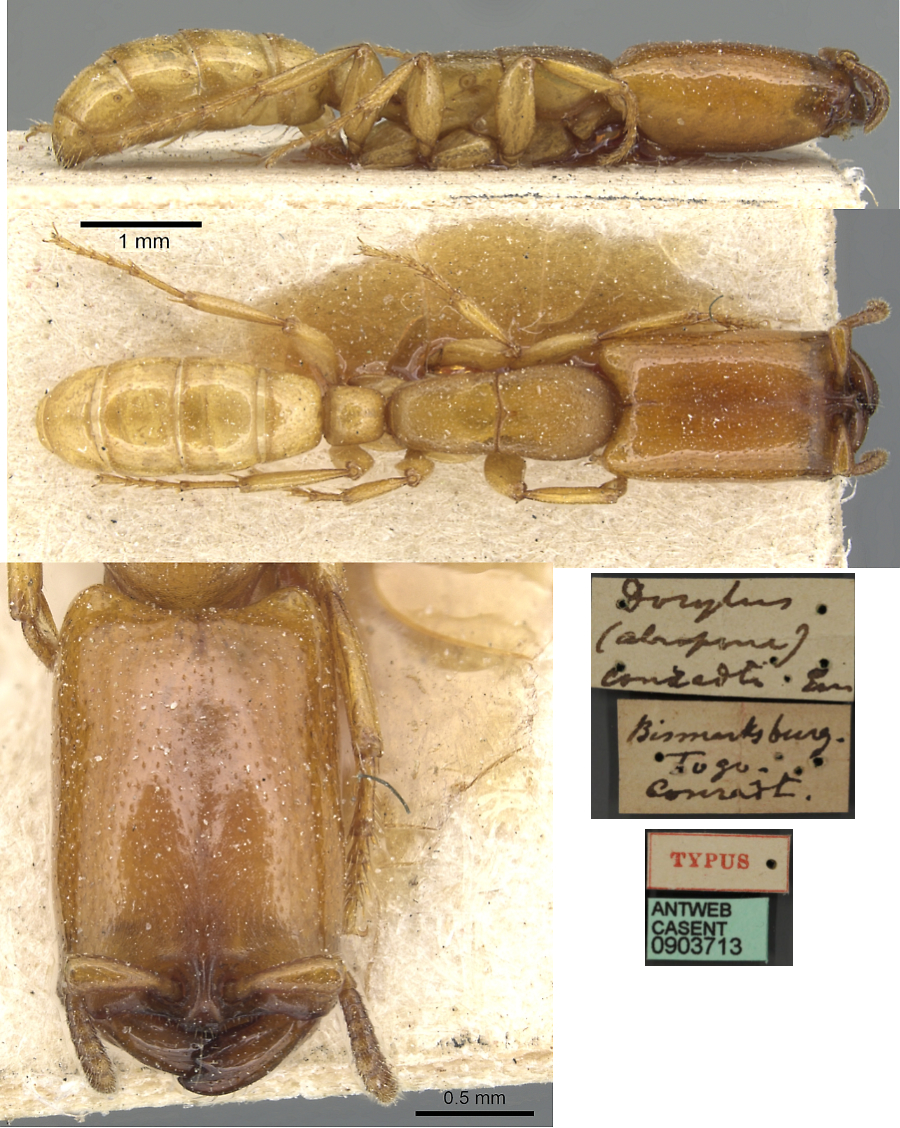 The
photomontage is of a type major worker collated
from http://www.antweb.org/specimen.do?name=casent0903713. The
photomontage is of a type major worker collated
from http://www.antweb.org/specimen.do?name=casent0903713.
|
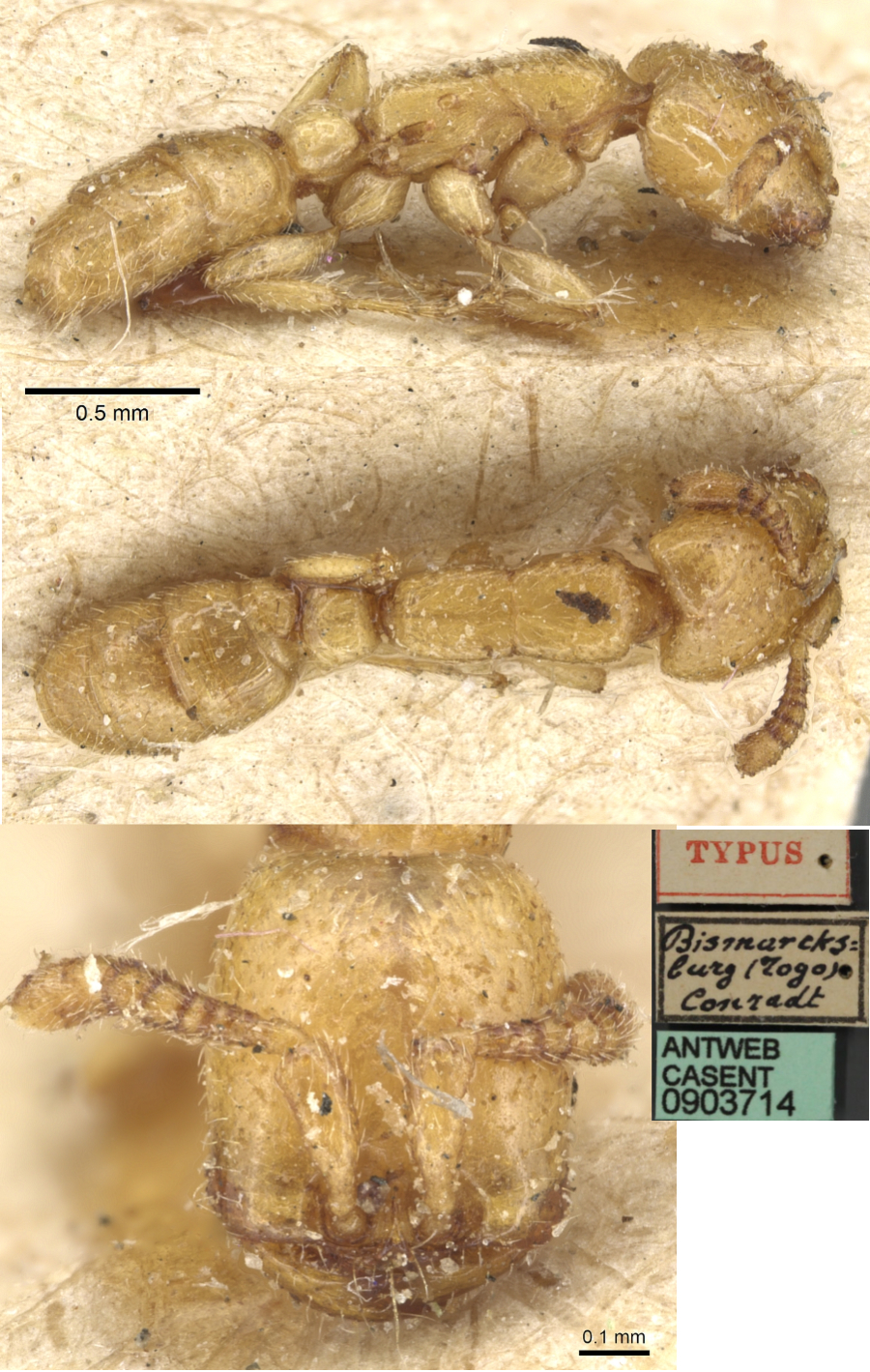 The
photomontage is of a minima (?) worker from the type collection
collated
from http://www.antweb.org/specimen.do?name=casent0903714. The
photomontage is of a minima (?) worker from the type collection
collated
from http://www.antweb.org/specimen.do?name=casent0903714.
|
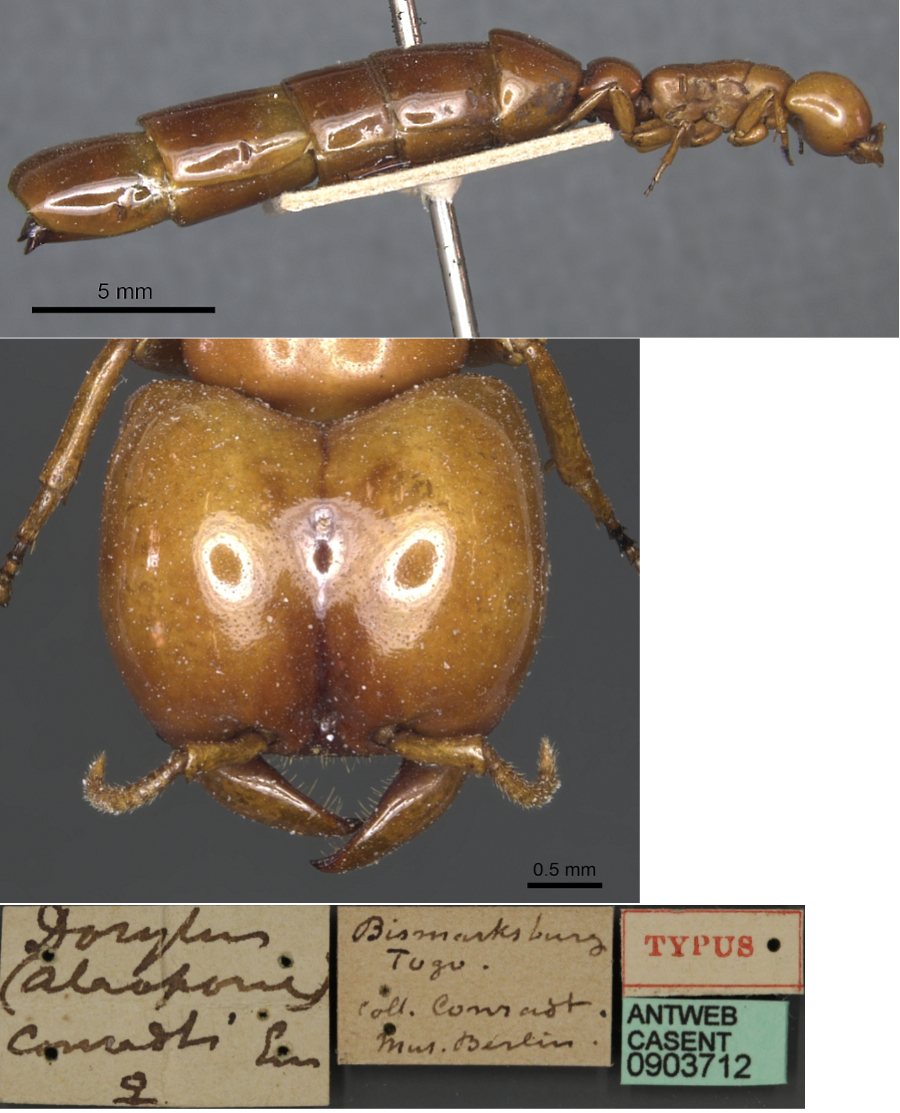 The
photomontage is of a queen from the type collection
collated
from http://www.antweb.org/specimen.do?name=casent0903712. The
photomontage is of a queen from the type collection
collated
from http://www.antweb.org/specimen.do?name=casent0903712.
|
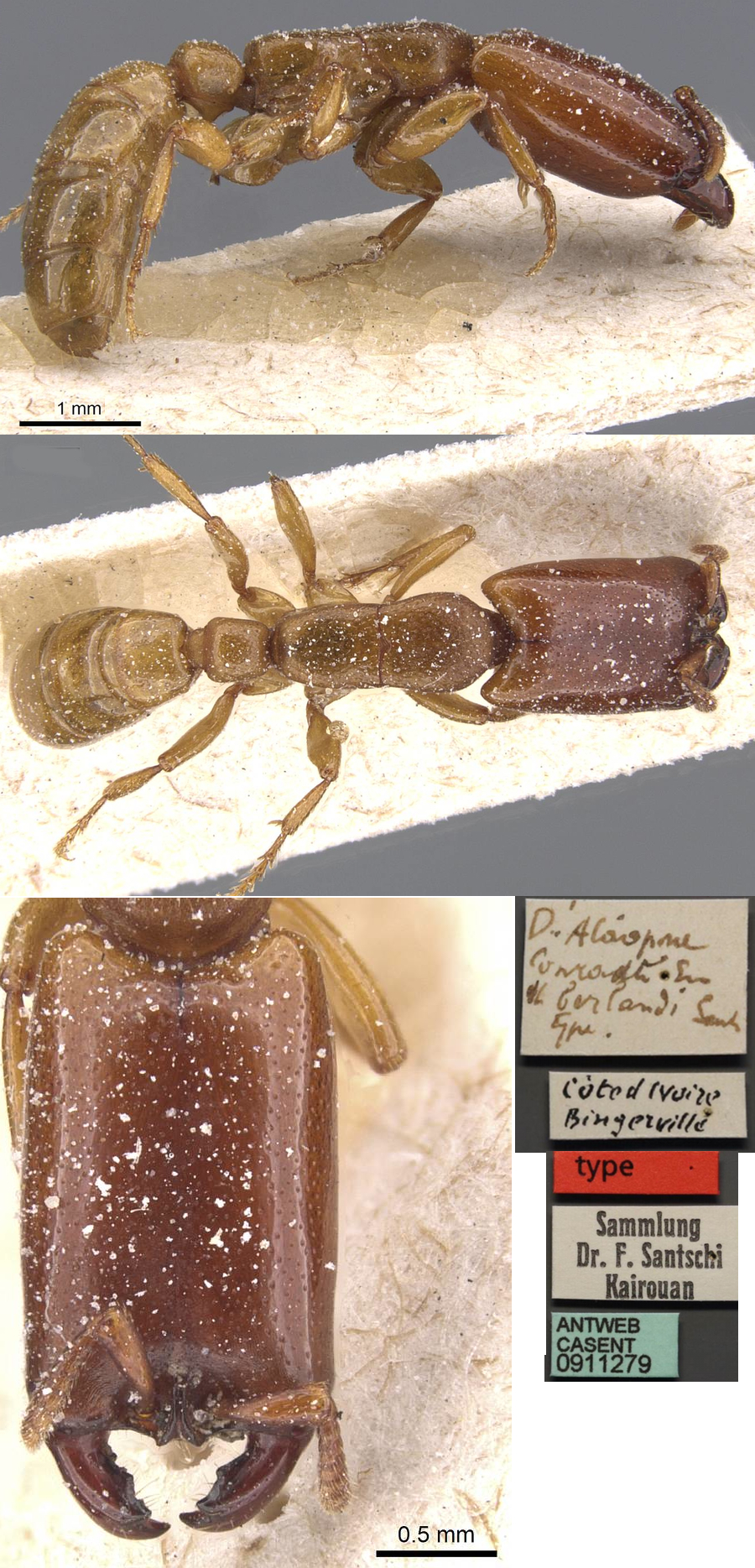 The
photomontage is of the berlandi type major worker collated
from http://www.antweb.org/specimen.do?name=casent0903713. The
photomontage is of the berlandi type major worker collated
from http://www.antweb.org/specimen.do?name=casent0903713.
Generally similar to the type form (above) but darker
and with a distinctly longer head and slightly differently shaped
alitrunk and petiole in dorsal view.
|
Oxford University Museum
specimens
Dorylus (Dorylus) braunsi
B Taylor det.
Male
|
Central African
Republic
P Annoyer
1998
|
16.vi.1998
Dzanga-Sangha |
Bayanga-Lidjombo;
U.V. 19h-05h; LAYON PK 21 5.0 RCA |
3
|
 |
|
 The
photomontage is of a speculative male from the Central African
Republic, Dzanga-Sangha NP; collector Philippe Annoyer (CAR 1998). The
photomontage is of a speculative male from the Central African
Republic, Dzanga-Sangha NP; collector Philippe Annoyer (CAR 1998).
|
 The
photomontage is of a further male from the Central African
Republic, Dzanga-Sangha NP; collector Philippe Annoyer (CAR 1998). The
photomontage is of a further male from the Central African
Republic, Dzanga-Sangha NP; collector Philippe Annoyer (CAR 1998).
|
|